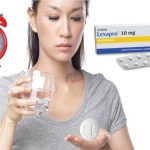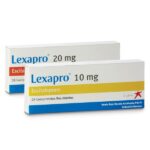Is 10mg of Lexapro Considered a Low Dose?

Depression is a common illness worldwide, with an estimated 3.8% of the population affected, including 5.0% among adults and 5.7% among adults older than 60 years. Approximately 280 million people in the world have depression. Not only does it take time to get an accurate depression diagnosis, finding the right medication to treat depression can be a complicated, delicate process. Someone may have a serious medical problem, such as heart disease or liver or kidney disease, that could make some antidepressants unsafe. The antidepressant could be ineffective for you or the dose inadequate; there may not have been enough time to see an effect, or the side effects could be too bothersome — leading to a failure of treatment.
Only about 30% of people with depression go into full remission after taking their first course of antidepressants. That’s according to a 2006 study funded by the National Institutes of Health. Those who got better were more likely to be taking slightly higher doses for longer periods. Some antidepressants work better for certain individuals than others. It’s not uncommon to try different depression medicines during treatment.
Some people need more than one medicine for depression treatment. Antidepressants carry a boxed warning about increased risk compared to placebo for suicidal thinking and behavior in children, adolescents, and young adults 18-24 years old.
What is Lexapro?
Lexapro is a brand of escitalopram, a good medication for treating depression and anxiety. It’s generally well-tolerated and has fewer drug interactions than other antidepressants.
Lexapro is used to treat depression in adults, children, and teenagers 12 years of age or older. Lexapro is also used to treat generalized anxiety disorder (GAD; excessive worry and tension that disrupts daily life and lasts for 6 months or longer) in adults.
How Lexapro works
Lexapro is in a class of antidepressants called selective serotonin reuptake inhibitors (SSRIs). It works by increasing the amount of serotonin, a natural substance in the brain that helps maintain mental balance.
How should Lexapro be used?
Lexapro comes as a tablet and a solution (liquid) to take by mouth. It is usually taken once a day with or without food. To help you remember to take Lexapro, take it at around the same time every day, in the morning or in the evening. Follow the directions on your prescription label carefully, and ask your doctor or pharmacist to explain any part you do not understand. Take Lexapro exactly as directed. Do not take more or less of it or take it more often than prescribed by your doctor.
Your doctor may start you on a low dose of Lexapro and increase your dose after 1 week.
It may take 1 to 4 weeks or longer before you feel the full benefit of Lexapro. Continue to take Lexapro even if you feel well. Do not stop taking Lexapro without talking to your doctor. Your doctor will probably decrease your dose gradually. If you suddenly stop taking Lexapro, you may experience withdrawal symptoms such as mood changes, irritability, agitation, nausea, dizziness, burning, numbness, or tingling in the hands or feet, anxiety, confusion, headache, sweating, shaking, frenzied or abnormally excited mood, tiredness, and difficulty falling asleep or staying asleep. Tell your doctor if you experience any of these symptoms while you are decreasing your dose of Lexapro or soon after you stop taking Lexapro.
Is 10mg of Lexapro a low dose?
No, the typical dose of Lexapro is 10 mg by mouth daily when used for depression or anxiety by adults and children over the age of 12. Lexapro low-dose is typically a 5 mg/day treatment.
It takes two to four weeks for Lexapro to show its full effect. Scientists believe that when you first start taking Lexapro, the higher levels of serotonin have direct effects which might not relieve your depression. In fact, you are likely to feel a bit more anxious and ‘on edge’ for a couple of weeks.
However, the medication can cause some insomnia or difficulty sleeping. To lower your risk of not being able to fall asleep, you can take the medication in the morning.
What are the other side effects of Lexapro?
Lexapro may cause sleepiness and tiredness. It can also cause other side effects.
More common side effects
The more common adult side effects of this drug are slightly different from the more common side effects for children.
• more common adult side effects can include:
o nausea
o sleepiness
o weakness
o dizziness
o anxiousness
o trouble sleeping
o sexual problems
o sweating
o shaking
o lack of hunger
o dry mouth
o constipation
o infection
o yawning
• more common children’s side effects can include:
o increased thirst
o abnormal increase in muscle movement or agitation
o unexpected nosebleeds
o difficult urination
o heavy menstrual periods
o possible slowed growth rate and weight change
o nausea
o sleepiness
o weakness
o dizziness
o anxiousness
o trouble sleeping
o sexual problems
o sweating
o shaking
o lack of hunger
o dry mouth
o constipation
o infection
o yawning
If these effects are mild, they may go away within a few days or a couple of weeks. If they’re more severe or don’t go away, talk to your doctor or pharmacist.
Serious side effects
Call your doctor right away if you have serious side effects. Call 911 if your symptoms feel life-threatening or if you think you’re having a medical emergency. Serious side effects and their symptoms can include the following:
• severe allergic reactions, symptoms can include:
o trouble breathing
o swelling of your face, tongue, eyes, or mouth
o rash, itchy welts (hives), or blisters (alone or with fever or joint pain)
Hives
• seizures or convulsions
• suicidal thoughts and behaviors
• serotonin syndrome, symptoms can include:
o agitation, hallucinations, coma, or other changes in mental status
o coordination problems or muscle twitching (overactive reflexes)
o racing heartbeat
o high or low blood pressure
o sweating or fever
o nausea, vomiting, or diarrhea
o muscle rigidity
• low sodium levels in your blood, symptoms can include:
o headache
o confusion
o difficulty concentrating
o thinking or memory problems
o weakness
o unsteadiness (which can lead to falls)
o seizures
• manic episodes, symptoms can include:
o greatly increased energy
o severe trouble sleeping
o racing thoughts
o reckless behavior
o unusually grand ideas
o excessive happiness or irritability
o excessive talking or speech that is faster than usual
• changes in appetite or weight
• visual problems, symptoms can include:
o eye pain
o changes in vision, such as blurred vision or double vision
o swelling or redness in or around your eyes
Lexapro may cause other side effects. Call your doctor if you have any unusual problems while taking this medication.
If you experience a serious side effect, you or your doctor may send a report to the Food and Drug Administration’s (FDA) MedWatch Adverse Event Reporting program online (http://www.fda.gov/Safety/MedWatch) or by phone (1-800-332-1088).





